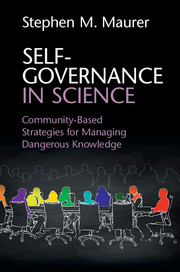Self-Governance in Science
Commercial and academic communities use private rules to regulate everything from labor conditions to biological weapons. This self-governance is vital in the twenty-first century, where private science and technology networks cross so many borders that traditional regulation and treaty solutions are often impractical. Self-Governance in Science analyzes the history of private regulation, identifies the specific market factors that make private standards stable and enforceable, explains what governments can do to encourage responsible self-regulation, and asks when private power might be legitimate. Unlike previous books which stress sociology or political science perspectives, Maurer emphasizes the economic roots of private power to deliver a coherent and comprehensive account of recent scholarship. Individual chapters present a detailed history of past self-government initiatives, describe the economics and politics of private power, and extract detailed lessons for law, legitimacy theory, and public policy.
- Describes how the economics of global supply chains confers power on dominant firms, and how this power is exercised
- Provides a new and explicitly economic theory of how science communities self-govern, emphasizing the central importance of professional networks in which members trade favors over time
- Systematically looks at opportunities for future self-governance, with a special emphasis on attempts to manage dangerous nuclear, chemical, biological, and cyber-technologies
Reviews & endorsements
'Stephen M. Maurer blends history, economics, political theory, and legal analysis to explain the dynamics of industry self-regulation. His wide-ranging case studies make Self-Governance in Science an engaging intellectual exploration of private alternatives to government regulation. Maurer has produced the leading analysis of a ubiquitous but underappreciated regulatory phenomenon upon which the modern market economy and regulatory state both depend.' Timothy D. Lytton, Distinguished University Professor and Professor of Law, Georgia State University College of Law, and author of Kosher: Private Regulation in the Age of Industrial Food
'Self-governance has become a trendy buzzword in many different areas, but science certainly counts among its most challenging fields of application. This book is therefore full of fascinating insights. While it refers to self-governance in science, its impact reaches much further. This book is a true must-read for anyone interested in self-governance, whether a lawyer, an economist, or a political scientist.' Florian Möslein, Philipps-Universität Marburg, Germany
'Self-Governance in Science explains how the mechanisms of power and control operate across the fuzzy boundaries of markets, governments, and nations. Maurer’s incisive analysis of expert communities in science and academia is especially timely in an era when their legitimacy is under renewed political and ideological attack.' Andrew L. Russell, Dean of the College of Arts and Sciences, State University of New York Polytechnic Institute
'It’s terrifically interesting and I recommend it to anyone interested in this area … This is a fascinating book, including the case studies, which range from atomic physics to fair trade coffee … anybody interested in raising standards in supply chains or finding ways to manage the deployment of new technologies will find a lot of useful insights here.' Diane Coyle, The Enlightened Economist
Product details
November 2017Adobe eBook Reader
9781316774298
0 pages
0kg
4 b/w illus.
This ISBN is for an eBook version which is distributed on our behalf by a third party.
Table of Contents
- Introduction
- Part I. The First Hundred Years:
- 1. Prelude: self-governance to 1980
- Part II. Commercial Science:
- 2. Legacy: the new self-governance
- 3. Commercial self-governance (I): private power
- 4. Commercial self-governance (II): private politics
- Part III. Academic Science:
- 5. Legacy: academic self-governance in modern times
- 6. Academic self-governance: power and politics
- Part IV. Legitimacy, Law and Policy:
- 7. Legitimacy
- 8. Law
- 9. Policy and practice
- 10. Extending the model
- Conclusion.





